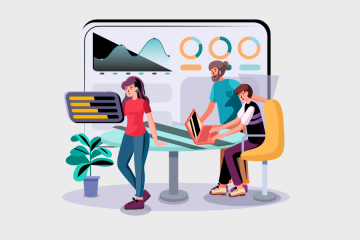As a child, I didn’t dream of growing up to be a brand marketer. I’m pretty sure that I wanted to be a police officer. Okay, that’s a lie; I wanted to be the fifth member of The A-Team (I was a child of the ’80s!) I definitely wasn’t thinking about project management, graphic design, and copy editing.
I did eventually leave my small hometown behind and stumble into college. Like many math-addled students who came before me, I majored in political science. I had always been interested in politics, so it seemed like the academic path of least resistance. And like most political science majors, I hoped and prayed that a job, any job, would materialize after leaving school. In my case, that wasn’t far from the truth! More about that later. Thus began a career in politics.
As a political operative, I got to log time in every essential campaign role. Management, fundraising, communications, research, field, digital, and data. I was always getting to learn new things and was frequently in over my head. Campaigning is hard work, but with very few exceptions (looking at you Rudy Giuliani Presidential Committee), it was fun and rewarding. Getting to the important point, and the reason I’m give you a rundown of my boring resume: at nearly every step of the way, I had access to someone more experienced who could mentor me. As I’ll explain, this is both rare and very fortunate.
If you’ve never worked on a political campaign before, understand that many of them operate in a culture of fear and intimidation. Campaigns are one of the most toxic working environments imaginable. Turnover is high; morale and pay very low. Expectations are almost always unreasonable and there is no HR department to hear your hostile work environment complaint. If you voice concerns about a superior’s behavior, you’ll probably never work in politics again. The most ruthless staffers tend to rise to the top and surround themselves with equally toxic personalities. I was generally very lucky in my career and got to work for some very good people, but that’s very much the exception in politics.
Horror stories abound of campaign staffers who just couldn’t cut it, even bright ones who were willing to put in the long hours. Everything that could go wrong very often does. Fundraising staff who couldn’t figure out how to raise enough money. Speech writers who were caught plagiarizing speeches. Field staff who didn’t have enough volunteers for election day activities. These were the cautionary tales which could have been avoided with patient mentoring.
Everyone needs a mentor, whether you realize it or not, whether you’re in politics or brand marketing. Your department or agency benefits from having experienced colleagues who can be a resource. This is true whether they are a designer, a copywriter, a salesperson, or a manager. You don’t even have to have the same employer (in fact, sometimes it’s better to talk to someone on the outside!) I had several great mentors when I got my first agency gig, and I wouldn’t have survived my first year without their patience as I tried to master AdTech.
Because we love lists here at The Green Note: here are five good reasons to get (or become!) a marketing mentor:
- Mentors have been there and done that. It’s likely that they have faced the same challenges as you and can help guide you past any potential pitfalls. Not sure how to close your pitch to that prospective client? Ask that seasoned sales shark in the cube next door.
- Skill development. Especially in today’s quickly evolving digital marketing space, a mentor can help you learn the ins and outs of your digital tools and best practices. Don’t understand how to set up event tracking in Google Analytics? Ask a colleague to patiently walk you through it. Need to quickly mask a photo background in Photoshop? Ask a designer to show you how!
- Professional development. Looking to advance in your career? Ask someone ahead of you about their professional journey.
- Connections. I’ve had mentors who took me to events or made introductions that have expanded my own network and led to further opportunities. I can backtrace my entire career to a chance meeting with a single person at a party I attended one night in Mississippi in 2003. I met a guy who introduced me to another guy which led to a job that led to everything that followed (more jobs, and eventually meeting my future wife…) New connections can lead to jobs, partnerships, and lucrative sales opportunities.
- Objectivity. A mentor can be detached from the task or job that you’re facing down. Perspective from outside your immediate team can provide the clarity you need to make a tough choice. Mentors can see a path where we often cannot, especially if you are clouded with emotion or facing an ethical conundrum.
Those are the reasons, and I think they are pretty good ones. Mentoring matters. Be a mentor, or be humble enough to ask one for help.


